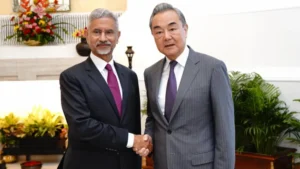 Chinese Foreign Minister Wang Yi said on Monday that India and China should see each other as “partners” rather than “adversaries or threats,” as he began a two-day visit to New Delhi.
Chinese Foreign Minister Wang Yi said on Monday that India and China should see each other as “partners” rather than “adversaries or threats,” as he began a two-day visit to New Delhi.
During the trip, Yi met with Indian Foreign Minister S. Jaishankar — their second meeting since 2020, when deadly clashes in the Galwan Valley in Ladakh, a disputed Himalayan border area, triggered a severe breakdown in relations.
Ahead of his scheduled meeting with Prime Minister Narendra Modi on Tuesday, Yi noted that bilateral ties were now moving on a “positive trajectory” towards cooperation.
Jaishankar acknowledged that both countries were working to “move forward from a difficult period in our ties.” The two ministers discussed a wide range of issues, including trade, pilgrimage routes, and sharing of river data.
Yi also held talks with India’s National Security Advisor Ajit Doval, focusing on ongoing efforts to resolve the long-standing boundary dispute. During their meeting, Yi emphasized that “stability has now been restored at the borders” and admitted that the setbacks of recent years “were not in our mutual interest.”
The visit is being interpreted as another sign of easing tensions between the nuclear-armed neighbors. Last October, India and China reached an agreement on new patrolling arrangements to de-escalate friction along the contested Himalayan frontier. Since then, steps toward normalization have included China reopening pilgrimage routes in Tibet for Indian visitors, India resuming visa services for Chinese tourists, and both sides agreeing to restart talks on opening border trade through designated passes. Reports also suggest that direct flights between the two countries could resume later this year.
Yi’s meetings are expected to set the stage for Modi’s first visit to China in seven years to attend the Shanghai Cooperation Organisation (SCO) summit later this month. While speculation continues that Modi may also hold bilateral talks with Chinese President Xi Jinping, neither side has confirmed it.
The thaw in relations comes at a time when India’s ties with the United States are deteriorating. Earlier this month, U.S. President Donald Trump imposed an additional 25% tariff on Indian imports over its purchases of Russian oil and weapons, raising total duties to 50% — the highest in Asia.
Adding to the tension, White House Trade Advisor Peter Navarro accused India in a Financial Times op-ed of “cozying up to both Russia and China.” He claimed India was helping Moscow by processing embargoed Russian crude oil into high-value exports, thus giving Russia access to dollars. “If India wants to be treated as a strategic partner of the U.S., it needs to start acting like one,” Navarro wrote.
After his talks with Yi, Jaishankar said discussions also covered wider global issues. “We seek a fair, balanced, and multipolar world order, including a multipolar Asia,” he stated. He added that “reformed multilateralism is the need of the hour” and stressed the importance of stability in the global economy in the current climate.
